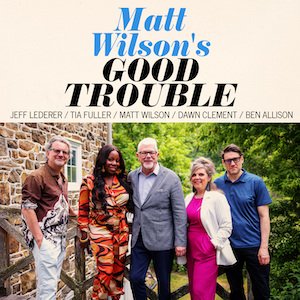Label: Palmetto Records, 2024
Personnel - Jeff Lederer: tenor saxophone, clarinet; Tia Fuller: alto saxophone; Dawn Clement: piano; Ben Allison: bass; Matt Wilson: drums.
Helming a powerful new quintet, drummer/composer Matt Wilson delivers an entertainingly gripping set of music with Good Trouble, marking his 14th release on Palmetto label. The album includes both originals and covers, paying tribute to congressman John Lewis and his fight for Civil Rights while also celebrating Wilson’s 60th birthday. The quintet features a dynamic two-horn frontline with longtime collaborator Jeff Lederer on tenor saxophone and new addition Tia Fuller on alto, while the rhythm section is rounded out with pianist/vocalist Dawn Clement and bassist Ben Allison, players capable of serious chops within a variety of musical contexts.
Wilson’s “Fireplace” pays homage to the late pianist Geri Allen, opening with a provocative riff and deliberate accentuations before the soloists are given ample room to cut loose. Lederer’s irresistible eloquence finds a complementary foil in Fuller, with whom he alternates bars with indomitable energy. “Albert’s Alley”, penned by Lederer and inspired by his dog, results in a cerebral bluesy neo-bop number with some polyphonic allure and smart moves.
The album’s centerpiece, Good Trouble Suite, is comprised of three parts.The first, “RBG”, honors justice Ruth Bader Ginsberg with a fresh Latin vibe and jubilant unisons, leading to exhilarating saxophone exchanges and the band singing her name. The second movement, “Walk the Wind” is a soulful ballad where Allison speaks his truth with thick, roving lines. The third act, “Good Trouble”, tricks the listener with early Monk-ish accents before embarking on a splendid carousel of gospel and dancing jazz revival.
This fascinating blend of traditional and modern elements enhances the appeal of the album, and this holds true for the four covers presented here, which straddle different styles and approaches. “Be That As it May”, penned by Wilson’s student Akihito Goray, takes the form of a soul-jazz ballad propelled by pleasing snare currents and polished by Clement’s voice. She also claims the spotlight in the rendition of John Denver’s country-folk hit “Sunshine on My Shoulders”. Yet, the standout interpretations are Ornette Coleman’s “Feet Music”, featuring a groovy bass solo and another heated dialogue between Lederer and Fuller, and Gary Bartz’s “Libra”, a post-bop dazzler.
The special warmth and kaleidoscopic eclecticism that keeps Wilson’s tunes so captivating continues in “Community Spirit”, which concludes the album with a contagious African rhythm in 5/4 time after a rubato gospelized inception. Wilson’s music is a joy to listen to, and this band, moved by an elevated sense of unity, truly delivers.
Favorite Tracks:
01 - Fireplace ► 04 - RBG ► 10 - Community Spirit








































